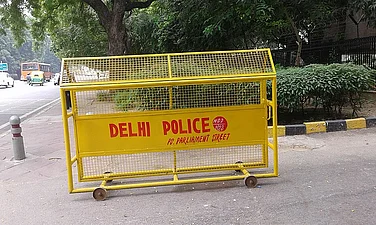A seven-year-old Tilak decided to stop drinking water during school hours to avoid having to pee and go to the school toilet. This went on throughout his entire school life. Tilak was bullied and harassed on multiple accounts when accessing the boys’ toilet. “I would be told that I am a girl, I should be in the girls’ toilet. They would push me, trying to see what was inside, I was asked what genitals I carry, if I pee standing or seated, asked to pee sitting as girls are supposed to,” he says.
The same routine would not just follow every day, but each time he would try to go to the toilet. Constant trauma and humiliation instilled fear in Tilak who started to hold back his pee for prolonged hours. He chose odd hours to use the toilet, often at the cost of being late for his classes. “I would wait for people to leave the washrooms, I would never go during breaks since I feared being harassed, mocked and stared.” He recalls hearing as a kid, “Why are you here? You need to go there as that’s where your toilet is..” Tilak’s struggle for an accessible toilet would extend throughout the day as he lived in a hostel. At the age of 19, Tilak was diagnosed with kidney stones in 2021. A medical aspirant, he hopes nobody has to put their body through the same due for the dearth of accessible toilets.
Trans model Siya Malasi, who featured in the recent Starbucks #ItStartsWithYourName campaign advertisement, in an interview shared that she would hold her pee for several hours to avoid being bullied inside the washroom. Noting that she started bunking school at one point, the 25-year-old model and actor attempted suicide at the age of 15.
When the founder and director of Akam Foundation, Assam based Trans activist Rituparna Neog visited Tezpur University in 2021 for one of her gender sensitivity programs as a guest speaker, she struggled to change into her saree as the university campus only accommodated “Male” and “Female” toilets. She was asked to use the faculty's toilet to make up for the ‘inconvenience.’ Such confrontations are not in isolation. Trans community faces discomfort and humiliation on an everyday basis as a lack of safe and accessible toilets in most public places.
Toilets have been a battleground for the Trans and Intersex community, who have been harassed, abused and denied access to these spaces. The vulnerability to harassment, violence and humiliation forces them to compromise their own physical and mental well-being. The common effects of drinking insufficient water and frequently holding one’s pee are urinary tract infections (UTIs), diabetes, kidney stones, abdominal pain, stress, anxiety, ureteral infections, dehydration and other mental health issues. They go through pervasive stigmatisation by cishet people, who visualise and portray the community as sexual offenders, which is contrary to reality.
My Genitals Are Not Your Business
While Trans activists have reiterated on several occasions that their genitals is their private affair and nobody’s business, their systematic exclusion provides sufficient proof of the “dichotomy of biological binary”. The heteronormativity of language, spatiality and physicality in a patriarchal structure acts to dominate the idea of morality in public spaces, translating into violence and gatekeeping. Based on the cynical assumption of violence and violation by Trans folks in public toilets, an argument that lacks supportive data or evidence, both cis men and women operate to keep Trans women and Trans men from accessing toilets and other public spaces.
In his fifth semester in 2021, Lipi contemplated dropping out of his master's in 2021. His college in Jorhat, Assam only had binary toilets and as an assigned female at birth, he had no option but to go to the ladies’ toilet every time to relieve himself. “People misgendered me multiple times, they would look at me weirdly when I entered the toilet sporting short hair and wearing a pant shirt.”
Lipi would wait every day for his girlfriend’s classes to be over, who was in a different department. He shares that he could only go to the toilet with her and never went alone. Lipi says that he hardly uses public toilets and wears a mask when using them to reveal the least about his gender identity. Currently, a master’s student at Guwahati University, he expresses hope for the college that plans on developing a gender-neutral toilet on the campus soon.
No More Holding My Pee

Embarrassed by the encounter with Neog, the Department of Social Work at Tezpur University took up the task and approached the administration for a gender-neutral toilet on campus. Neog’s campaign, “NoMoreHoldingMyPee”, launched formally on June 5, 2022, fights to free Trans and non-binary people from social norms that have forced them to self-censor themselves from using toilets in public places and hold their urge to pee for long hours. She started her advocacy work by the end of 2021, which has been growing in terms of allyship and ground effects. So far, the movement has helped get gender-neutral toilets at The Department of Social Work Tezpur University, Dispur College and Jawahar Nehru College, Boko, with at least three others in the pipeline.
Neog asserts the Right to Education and explains that education has long been due to the Trans community. They have also been categorically denied equal and universal accessibility to public infrastructure. Gender-neutral toilets are one way for education institutes to send a strong message on inclusivity through gender affirmative action, she says. “Formal education empowers you and gives you the confidence to stand wherever you want”. Neog recalls that during her own college days, she had to live in a PG and spend extra money despite coming from a middle-class background as she could not access the binary toilets in the college or hostel. She reflects on the complicity of Transphobia and exclusionary politics of public spaces while adding that fighting for public gender-neutral toilets is yet a utopian dream.
Since there are yet no provisions for non-binary hostels in education institutions, when Tezpur University decided to make a gender-neutral toilet on its campus, it was a huge step for Damji Millan, a Transwoman enrolled in a Master’s program at the university. “My experiences in public toilets and libraries have made me very sceptical. If I go to a women’s toilet, which I am supposed to, I am asked to go to the men’s toilet. If I go to the men’s toilet, I am scared of violence. I have held my pee for unrealistic hours. Now with a gender-neutral toilet on the campus, I no longer have to be scared of being touched, harassed or shouted at for being in the wrong place.”
As she travels across Assam and outside for her gender sensitivity program and the quest for gender-neutral toilets in education institutions, Rituparna Neog has enabled a conversation and movement for safe inclusive spaces for the young queer people in the state. But activism does not work magically. The road to equality is a long journey to embark on. After a disturbing toilet experience at Delhi Airport in January 2023, Neog evades going to public washrooms while travelling. “I drink very less water when I am outside or travelling. I have experienced frequent dehydration and abdominal pain because of the same,” Rituparna says. However, she, along with her community are resilient to fight for their chance to pee in peace.


























